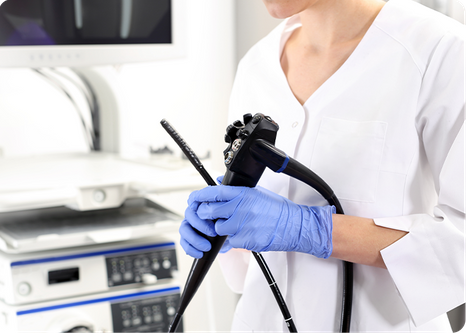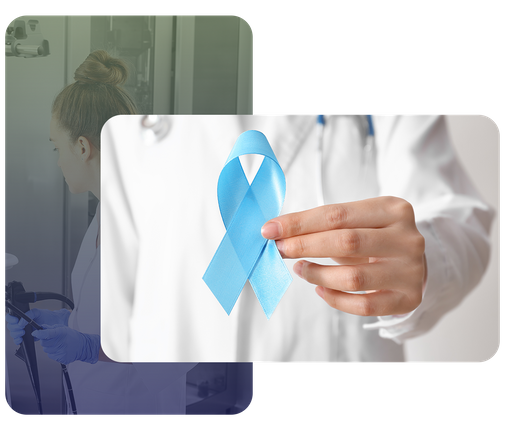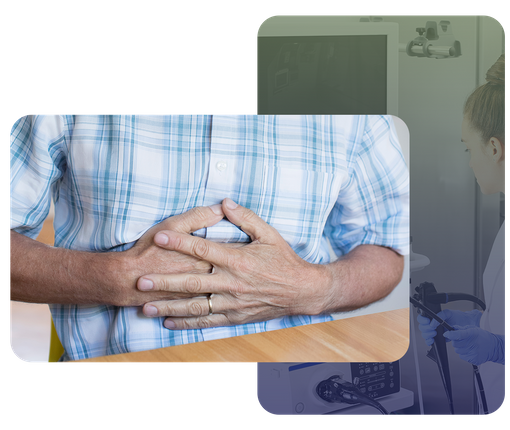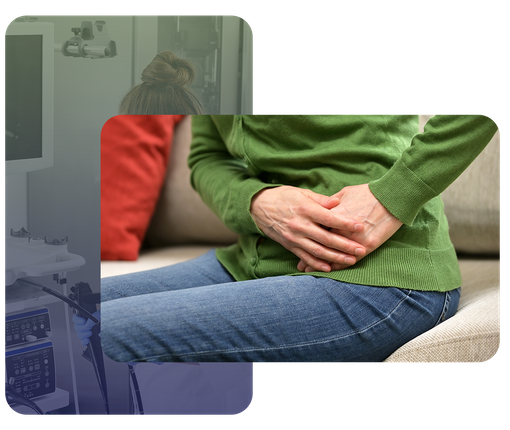COLON CANCER SCREENINGS CAN BE LIFE SAVING. IS IT TIME FOR YOURS?
Over 140,000 new cases of colorectal, or colon cancer are diagnosed each year, making it the third most common type of cancer and the second-leading cause of cancer-related death in the United States. However, when detected in its early stages, colon cancer is very treatable. That's why it's important to have regular colon cancer screenings — even when you are not experiencing any digestive issues or have any symptoms.
Colon cancer diagnoses for people under age 45 are on the rise, it’s more important than ever to address your concerns and get your screenings on time. A colonoscopy is the most effective form of colon cancer screening that is available to patients today. Unlike other forms of cancer screenings which can only detect a problem, colorectal screening with a colonoscopy can prevent colon cancer by allowing gastroenterologists to detect and remove precancerous lesions — or polyps — during the examination.
With colon cancer being so prominent yet preventable through colonoscopies, you may be wondering when you should schedule an appointment with a colonoscopy doctor. At Northeastern Gastroenterology Associates, our team of doctors and gastroenterology specialists in Honesdale, PA is committed to spreading awareness about colorectal cancer and the importance of colon cancer screenings. If you haven’t had a colonoscopy before, we know how daunting this procedure can seem at first. Fortunately, we put together a guide to help you better understand the procedure and determine when you’ll need to schedule your colonoscopy with your doctor.
Colon Cancer by the Numbers

Colorectal cancer is the second leading cause of cancer-related deaths in men and women combined in the U.S.

It is estimated that over 140,000 new cases of colorectal cancer are diagnosed in the United States each year.

Colon cancer is the third most common type of cancer that is diagnosed in men and women combined in the U.S.

There are now more than 1.5 million survivors of colorectal cancer in the US thanks to colon cancer screenings.
Cancer is a disease in which cells in the body grow out of control. When cancer develops in the colon or rectum, it is referred to as colorectal cancer. Most colorectal cancers start as a growth on the inner lining of the colon or rectum. Some of these growths, often referred to as polyps, can turn into cancer over time. When cancer forms in a polyp, it can grow into the wall of the colon or rectum over time. The wall of the colon and rectum is made up of many layers, colorectal cancer starts in the innermost layer and can spread outward through some or all of the other layers.
When cancer cells have developed in the wall, they can spread further into blood vessels or lymph vessels. From there, they can travel to nearby lymph nodes or distant parts of the body. For this reason, it is important to get a colon cancer screening when you reach a certain age or face risk factors that may increase your chances of colorectal cancer.
Why A Colonoscopy?
A colonoscopy procedure can be life-saving. It’s one of the few colon cancer screening procedures that can effectively detect precancerous lesions and abnormalities in the colon and rectum before they spread further. Colon polyps are at high risk of turning into cancer if they are not detected and removed. During a colonoscopy procedure, these polyps can be discovered and removed on the spot — essentially preventing cancer or a long road of potential treatments ahead. When a colon polyp is removed before it turns into cancer, further treatment generally isn’t needed — no surgery, no chemotherapy, no ostomy.
The procedure is used to help gastroenterology specialists examine the inside lining of the colon, which is where colon cancer starts. During a colonoscopy, a long, narrow, flexible tube with an HD camera at the end is used to evaluate the rectum and colon. The doctor can take tissue samples or remove small polyps for further examination, if necessary, during the procedure. As a nation, we could see a significant decline in colon cancer diagnoses if more people scheduled routine colonoscopies for colon cancer screenings.
Reasons to Schedule a Colonoscopy Earlier
Five Things You Should Know About Colonoscopies
If you have never had a colonoscopy procedure before, you may be anxious. The good news is, that you’re not alone. Many people find colorectal cancer screenings intimidating because of the procedure involved. On top of that, a lot of misinformation gets spread about what to expect before, during, and after the life-saving procedure. Contrary to what most people think, here are some things you should know about colonoscopy screenings:
1. The Procedure Is Not Painful
Some people are anxious about getting a colonoscopy for the first time, but very few patients experience pain or discomfort during the procedure. Before the colonoscopy procedure, patients are lightly sedated to help them feel relaxed and comfortable. No pain is experienced during the procedure — the most common symptom patients experience following a colonoscopy is bloating.
2. The Procedure Is Safe
A colonoscopy is a minimally invasive procedure, so it does carry little risk — mostly due to the anesthesia used to relax the patient undergoing the procedure. For most patients, however, the risks associated with a colonoscopy are relatively low. The procedure is performed in a closely monitored environment in which gastroenterology and anesthesiology teams care for the patient before, during, and after the procedure. Doctors also closely review the medical history of patients before undergoing a colonoscopy to ensure any risks are minimized.
3. The Procedure Is Quick
While it is recommended that you take the entire day off of work on the day of the procedure, a colonoscopy is a relatively quick procedure. In most cases, the procedure lasts around 30 minutes. If polyps are found and need to be removed, it may take longer. Once the colonoscopy procedure is finished and the sedation wears off, patients get dressed and meet with their gastroenterologist, who will review the results of the procedure.
4. Colonoscopy Prep Isn’t That Bad
You have probably heard about the unpleasantness of colonoscopy preparation. While it is true that colonoscopy prep instructions in the past were down-right awful, significant strides have been made to improve and refine what patients need to do to prepare for the procedure. Patients are asked to consume a bowel preparatory to help clear the bowel before the examination. Many colonoscopy doctors will suggest following a split preparation method, which involves drinking half of the bowel prep the night before your procedure and the other half the morning of.
5. You’re Not Necessarily Too Young for a Colonoscopy
While guidelines call for colorectal cancer screenings starting at age 45 for those at average risk, patients can get a colonoscopy before they reach that milestone, especially if they are at an increased risk. Remember, the risks of developing colorectal cancer are increased if you have a family history of colon cancer, have been diagnosed with IBD, or have been experiencing gastrointestinal issues, among other factors. If you are at an increased risk of colon cancer, you’ll want to be screened earlier, typically at age 40. Research has shown a sharp rise in colorectal cancer rates among adults in their 20s and 30s, so it's better to get tested sooner rather than later.
Again, the most important thing to remember about a colonoscopy is that it can save your life. Many patients that end up delaying a colonoscopy often end up later regretting not getting the quick and painless procedure done at a younger age. You don’t have to feel anxious, your gastroenterology specialists will go to the necessary lengths to ensure your comfort. On-time colon cancer screenings are the most effective way for colonoscopy doctors to identify and remove multiple polyps, successfully preventing the progression of colorectal cancer in these patients.




